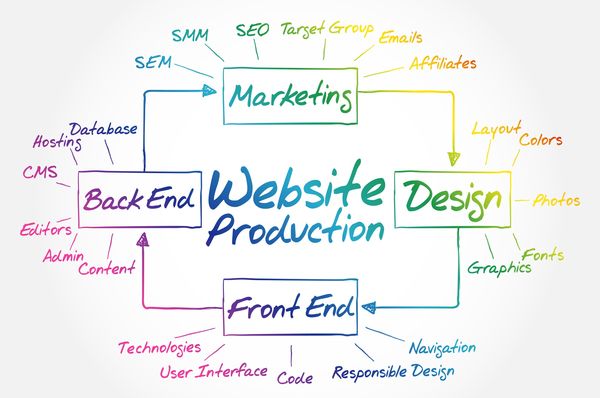In recent years, the term full-stack engineer has gradually become widespread, and it is gaining increasing attention as a career path for engineers.
On the other hand, there are not always opportunities to see the existence of full-stack engineers at the development site, and I think that some people may not understand the actual situation.
In this article, we will give you an overview of full-stack engineers and the skills required.
table of contents
1. What is a full stack engineer?
1.1 Main work of full stack engineer
2. Skills required for full stack engineers
2.1 Front-end side development skills
2.2 Back-end side development skills
2.3 Mobile service-related skills
2.4 Cloud service-related skills
2.5 Management skills
3. Why a full stack engineer is needed
3.1 Impact of shortened system development period
3.2 Increased response after system release
3.3 Change in value of IT engineers
4. To become a full stack engineer
4.1 Accumulate experience and achievements in project development
4.2 Improve information gathering and analysis capabilities of IT industry trends
4.3 Study and practice continuous technology
5. Summary
1. What is a full stack engineer?
The word full-stack engineer can be translated as “full = full” and “stack = stack”, and the combined “full-stack” includes “knowledge about multiple IT-related fields”. It means “have the technology”.
As the name implies, a full-stack engineer is an all-rounder engineer who has the skills of accumulating knowledge and skills in multiple IT specialties and can utilize the skills in all processes of system development.
1.1 Main work of full stack engineer
Full stack engineers have no clear definition. Therefore, the required skills, experience, and work content differ depending on the company and each project.
In many cases, the full-stack engineer is responsible for “system construction / design,” “implementation,” “design,” and “operation,” while system development is usually carried out in a division of labor style.
2. Skills required for full stack engineers
A full stack engineer who is familiar with multiple disciplines.
What kind of skills and knowledge do you really need?
2.1 Front-end side development skills

The front end is the part that is visible to the user and is the part that is related to the appearance of the website.
Design, construction and implementation skills using HTML, CSS, JavaScript, WordPress, etc. are required.
2.2 Back end side development skills
The back end is the part that is not visible to the user, and refers to the Web server side for data processing, storage, etc.
Knowledge of various programming languages, such as Java, Python, PHP, Ruby, etc., and knowledge of database and security are also essential.
2.3 Mobile service related skills

With the spread of smartphones, technologies for mobile services such as mobile application development are indispensable.
In addition to Java, Python, and JavaScript, mobile application development languages include kotlin for Android and Swift for iOS in recent years.
2.4 Cloud service related skills

In recent years, cloud services have become widespread, and the number of companies using cloud services is increasing.
For example, the major cloud services currently include AWS (Amazon Web Service), Azure (Microsoft), and GCP (Google Cloud Platform).
Full-stack engineers are also required to have the skills to adopt cloud services, design and build them, connect them to operations, and prepare the infrastructure.
2.5 Management skills
Although he is a full-stack engineer who is responsible for a wide range of system development, he does not necessarily carry out the work alone, and it is necessary to communicate and collaborate with the development team. As the project progresses, management skills are required for the smooth promotion of the project, including progress management and appropriate staffing.
3. Why a full stack engineer is needed
We will explain why full-stack engineers are being sought after the remarkable technological innovation of IT, and what the expected full-stack engineers should be in the future.
3.1 Impact of shortened system development period
In recent years, changes have been seen in system development methods.
Conventional mainstream development method: Waterfall development (first set the period and order, and systematically develop)
Development method that has been increasing in recent years: Agile development (correction / improvement while repeating development in a short period of time)
Now that agile development is increasing, it is no longer necessary to have a large number of engineers who support system development .
[Role expected of a full-stack engineer]
Engaged in the development of the entire system and flexibly responds to changes in specifications, etc.
3.2 Increased support after system release
Unlike in the past, where the role was until the system was released, as system development has become shorter, there are increasing requests for operations, function improvements, and function additions after the system is released.
[Role expected of full-stack engineers]
Flexible response to post-release operations, repairs, and function additions
3.3 Changes in the value of IT engineers
In recent years, the hurdles for becoming an IT engineer have been lowered.
Behind this are the enhancement of online learning and schools for acquiring IT skills, the spread of cloud services, and the simplification of system development by utilizing frameworks.
As a result, there is a tendency for highly skilled engineers to be required for the same hiring, and an increasing number of companies are utilizing offshore development, which requires low labor costs for simple programming work.
4. To become a full stack engineer

No special qualifications are required to become a full stack engineer. Rather than having a qualification, it is important how much experience and achievements you have and what skills you can demonstrate in the system development you are involved in.
4.1 Gain experience and achievements in project development
While engaging in actual development, you will experience various tasks. As a result of accumulating skills and experience, it can be said that the skills as a full-stack engineer are naturally acquired.
In addition, some recruitment websites clearly state that even inexperienced or inexperienced engineers can aim to become a full-stack engineer, and they can be involved in a wide range of fields from the front end to the server side and gain experience. Is possible.
4.2 Improve information gathering and analysis capabilities of IT industry trends
The IT industry is undergoing rapid technological evolution within a year. Engineers who are responsible for the evolution of programming languages, changes in development methods, and system development always face new technologies while working.
Of course, if you want to become a full-stack engineer, you need the information gathering and analysis skills of the IT industry.
4.3 Continuing study and practice of technology
A full stack engineer requires a wide range of knowledge and skills. It is important to constantly improve your skills by improving your skills in your specialized field and taking on challenges in new technologies, and it is also very important to practice and acquire them at the actual development site. is.
The wider the range of skills you have, the wider the range of places where you can play an active role as an engineer.
5. Summary
Full-stack engineers who require a wide range of IT technology knowledge and skills will find it useful in various system development sites by having the skills mentioned above.
And a full-stack engineer is also considered to be an engineer who has the ability to handle a wide range of tasks, such as the fact that the company can be entrusted with work that “reaches the itch.”
Therefore, even if you do not have all the skills at present, you can strengthen your strengths and keep an eye on the trends in the IT industry while constantly improving your skills. It will lead to the path to becoming a full-stack engineer required by customers and customers.
A full-stack engineer who has multiple roles by himself may have a difficult image, but the skill of having his own strengths and being able to grasp the entire system development is also advantageous for changing jobs, and he is active as an engineer. It can be said that it is one of the rewarding careers that expands the field.

